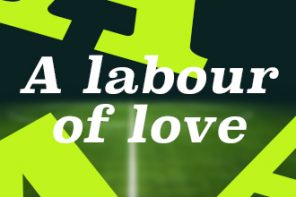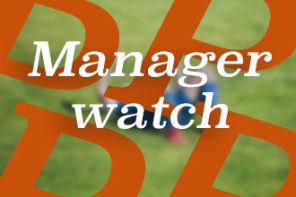It’s a shame that many people remember Graham Taylor as a failure. The man who didn’t get England to the 1994 World Cup, depicted as a root vegetable in the Sun, who told an official in Rotterdam that “your pal has just cost me my job.” Because he really was a very good manager, and 32 years ago he did something extraordinary.
Newly promoted teams don’t really make much of an impression on the Premier League these days. The last one to even finish in the top half was Reading, who came eighth in 2007, but it used to happen all the time. However, there weren’t many more extraordinary tales than in 1982/83, when Taylor took Watford to second place, finishing only behind Bob Paisley’s Liverpool.
When Taylor, aged just 32, arrived at Vicarage Road in 1977 (having turned down top-flight West Brom), the club were languishing in the Fourth Division, but with a new, wealthy and enthusiastic owner in Elton John and a young manager in place, their sights were set rather higher. Even when the club were still in the bottom tier, John wanted to qualify for Europe, but Taylor was a little more cautious, reckoning being in the top flight in ten years would represent success. They managed it in five.
It was a truly remarkable feat for the Hornets to even be in the rare company of the elite, never mind to mix it at the very top, but mix it they did. After four wins in their first five games, Watford were top of the table.
“To be truthful,” said Pat Rice, signed from Arsenal to provide some experience and guidance, “I thought if we could survive in Division One it would have been a good achievement. I never thought in a million years we could finish second.” Few did.
And yet, it appeared they were never really given the credit they deserved, with their admittedly direct style offending the sensibilities of the land’s aesthetes, wringing their hands at what a few long balls would mean for the children/state of the game in England. Even from their first game, a 2-0 victory over an Everton side that would win the league, FA Cup and Cup Winners’ Cup in the following season, compliments were at best back-handed, with the two goals that day described by the Times as ‘absurd’ and ‘bizarre’. Nevertheless, John Barnes and Luther Blissett were both called up for the England squad in October, Bobby Robson at least recognising something was happening at Vicarage Road.
The scepticism wasn’t confined to the press, either. “They play Third Division cup football,” an unnamed manager told the Observer, after Watford had beaten his side, which one might call notable. The second game of the season was at Southampton, where Alan Ball was winding down his career, to the extent that he spent some of the previous summer earning some extra coin playing in Australia. The Watford side were on the same plane as Ball as they travelled to a post-season tour, and the two parties enjoyed some banter, together, the World Cup-winner expressing his doubts that the Hornets could cope in the top flight. In a tale told in Lionel Birnie’s excellent book on Watford in the 1980s ‘Enjoy The Game’, after they won 4-1 at the Dell, Taylor accosted Ball. “Not bad for a side that can’t fucking play, are we?” he said. “He (Ball) was as good as gold and took it well.”
Two more victories (over Swansea and West Brom) took them to the summit, an implausible feat made all the more extraordinary because almost exactly seven years earlier, they had been at the foot of the entire league pyramid, stone bottom of the Fourth Division. The next game was a 2-0 defeat to Nottingham Forest, but they recovered to record an 8-0 victory over Sunderland the next week, Blissett scoring four. It could’ve been more, too – they hit the woodwork four times, had one denied by a Sunderland handball and Alan Durban, in the opposition dugout, conceded his team were lucky to get off so lightly. ‘Rarely have I seen a side so utterly in control,’ wrote Robert Oxby in the Daily Telegraph, also recounting that Chris Turner in the Sunderland goal pulled off a number of outstanding saves. Watford were a team to be taken seriously.
The season wasn’t all industrial thrashings of the top flight’s more average sides, either; Watford also beat Arsenal 4-2 at Highbury (after which Hugh McIlvanney commented in the Observer that ‘surely there is room in the Football League for one side so determined to charge the opposition into disarray’) and 2-1 at home, while they also recorded a win over champions Liverpool, admittedly in the final game of the season when Paisley’s side were winding down, the title already long won. The Liverpool players and staff stuck around afterwards for fish and chips.
They also gave Tottenham, a side beloved of the ‘purists’ and with Glenn Hoddle and Ricky Villa in midfield, a bloody nose at White Hart Lane. Indeed, during the pre-match warm-up, Hoddle poked fun at the visitors by repeatedly booting the ball as high in the air as possible, but when the game started he wasn’t allowed to settle, Les Taylor and Kenny Jackett suffocating the most languid of playmakers in midfield. The game looked like it was heading for a stalemate, only for Taylor to poke in a late winner after Hoddle failed to track his run. “I’ll never play their way,” sniffed Spurs boss Keith Burkinshaw after the game, while the Times called them ‘openly unsophisticated’. Hoddle actually said “All you do is hit long balls” to defender Steve Sims during the game. These were uncouth upstarts who should not be permitted to have nice things.
Not that Taylor seemed to care. “Should I ask you to spend £5 to watch a man, earning maybe £1,000-a-week, get the ball, knock it sideways, get it back and then knock it sideways again and ask you to appreciate that he’s a good player?” he told the Observer early on in the season. “I believe in playing the ball forward as often and quickly as possible, knowing that I risk losing possession in doing so. But although it’s anathema to many people in the game to say this, goals come from mistakes, not possession.”
In truth Watford never really stood a chance of actually winning the league. Liverpool were crowned champions with five games to spare and were a class above everyone else, something emphasised by the chasing that Watford received in December at Anfield, lucky to escape with just a 3-1 defeat.
But still, this was an extraordinary feat, and while they did have a chairman with money, it was not one reached by spending. Taylor didn’t make any significant signings the summer after promotion, Blissett had been with the club since the Fourth Division days, Barnes was spotted playing in a local park aged 17, Jackett was a youth team product, striker George Reilly was signed from Cambridge United, midfielder Jan Lohman cost £35,000.
“My view from the start was that we were in the First Division by right,” Taylor told Birnie in ‘Enjoy The Game’. “We were not going to set about it in anything other than a wholehearted manner. I told the players we would not be changing our style and that we were going to attack these teams as much as possible. I said that if the other teams showed us how good they were an we got our bottoms smacked once in a while, fair enough. But I am telling you, some of them are not as good as they think they are.”
He was as good as his word. Watford finished second despite losing 15 games and conceding 57 goals (Birmingham, who escaped relegation on the last day and survived by three points, lost 16 and conceded 55), but only Liverpool won more games and out-scored them. They might not have been pretty, but the idea that this Watford team were not entertaining was nonsense.
“The object was to try and win every game,” said Taylor. Quite so, and win plenty they did.
What happened next
Watford reached the third round of the UEFA Cup the following season, knocking out Kaiserslauten and Levski Sofia before losing to Sparta Prague, and also reached the FA Cup final where they were beaten by Everton. Taylor left for Aston Villa and Barnes for Liverpool in 1987 and, after a disastrous eight-month spell in charge by Dave Bassett, they were relegated in 1988.
You can follow Nick Miller on Twitter (@nickmiller79)






